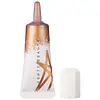Fenty Beauty Liquid Killawatt Fluid Freestyle Highlighter Versus Grande Cosmetics Grandeglow Plumping Liquid Highlighter
What's inside
What's inside
 Key Ingredients
Key Ingredients

 Benefits
Benefits

 Concerns
Concerns

 Ingredients Side-by-side
Ingredients Side-by-side

Water
Skin ConditioningDimethicone
EmollientIsododecane
EmollientMica
Cosmetic ColorantButylene Glycol
HumectantPEG-10 Dimethicone
Skin ConditioningCetyl PEG/PPG-10/1 Dimethicone
EmulsifyingCalcium Sodium Borosilicate
Disteardimonium Hectorite
Stabilising1,2-Hexanediol
Skin ConditioningCaprylyl Glycol
EmollientPropylene Carbonate
SolventSodium Dehydroacetate
PreservativeTriethoxycaprylylsilane
Propanediol
SolventPhytic Acid
Tin Oxide
AbrasiveGlycerin
HumectantSalvia Sclarea Extract
AntiseborrhoeicPotassium Sorbate
PreservativeSodium Benzoate
MaskingCI 77491
Cosmetic ColorantCI 77891
Cosmetic ColorantWater, Dimethicone, Isododecane, Mica, Butylene Glycol, PEG-10 Dimethicone, Cetyl PEG/PPG-10/1 Dimethicone, Calcium Sodium Borosilicate, Disteardimonium Hectorite, 1,2-Hexanediol, Caprylyl Glycol, Propylene Carbonate, Sodium Dehydroacetate, Triethoxycaprylylsilane, Propanediol, Phytic Acid, Tin Oxide, Glycerin, Salvia Sclarea Extract, Potassium Sorbate, Sodium Benzoate, CI 77491, CI 77891
Cyclopentasiloxane
EmollientWater
Skin ConditioningMica
Cosmetic ColorantCI 77891
Cosmetic ColorantIsododecane
EmollientPEG-10 Dimethicone
Skin ConditioningMenthone Glycerin Acetal
RefreshingButylene Glycol
HumectantDisteardimonium Hectorite
StabilisingSodium Chloride
MaskingMagnesium Sulfate
Phenoxyethanol
PreservativeCI 77491
Cosmetic ColorantPEG/PPG-18/18 Dimethicone
EmulsifyingTriethoxycaprylylsilane
Disodium EDTA
Ethylhexylglycerin
Skin ConditioningPropanediol
SolventTin Oxide
AbrasiveCaesalpinia Spinosa Gum
Skin ConditioningDimethicone/Vinyl Dimethicone Crosspolymer
Skin ConditioningCaprylic/Capric Triglyceride
MaskingPyrus Malus Fruit Extract
Skin ConditioningMaltodextrin
AbsorbentEvodia Rutaecarpa Fruit Extract
Skin ConditioningAlcohol
AntimicrobialAnanas Sativus Fruit Extract
Skin ConditioningPyrus Communis Fruit Extract
Skin ConditioningRubus Idaeus Leaf Extract
Skin ConditioningWine
Skin ConditioningCitrus Aurantium Dulcis Fruit Extract
MaskingVanilla Planifolia Fruit Extract
Skin ConditioningCyclopentasiloxane, Water, Mica, CI 77891, Isododecane, PEG-10 Dimethicone, Menthone Glycerin Acetal, Butylene Glycol, Disteardimonium Hectorite, Sodium Chloride, Magnesium Sulfate, Phenoxyethanol, CI 77491, PEG/PPG-18/18 Dimethicone, Triethoxycaprylylsilane, Disodium EDTA, Ethylhexylglycerin, Propanediol, Tin Oxide, Caesalpinia Spinosa Gum, Dimethicone/Vinyl Dimethicone Crosspolymer, Caprylic/Capric Triglyceride, Pyrus Malus Fruit Extract, Maltodextrin, Evodia Rutaecarpa Fruit Extract, Alcohol, Ananas Sativus Fruit Extract, Pyrus Communis Fruit Extract, Rubus Idaeus Leaf Extract, Wine, Citrus Aurantium Dulcis Fruit Extract, Vanilla Planifolia Fruit Extract
Ingredients Explained
These ingredients are found in both products.
Ingredients higher up in an ingredient list are typically present in a larger amount.
Butylene Glycol (or BG) is used within cosmetic products for a few different reasons:
Overall, Butylene Glycol is a safe and well-rounded ingredient that works well with other ingredients.
Though this ingredient works well with most skin types, some people with sensitive skin may experience a reaction such as allergic rashes, closed comedones, or itchiness.
Learn more about Butylene GlycolCi 77491 is also hydrated iron III oxide. It's sole purpose is to give a red/pink hue to products.
Iron III oxides are classified as inorganic chemicals for coloring.
Synthetically created Ci 77491 is considered safer than those naturally found. This is because the synthetically created version may contain less impurities. Iron oxides are generally non-toxic and non-allergenic.
Learn more about CI 77491Ci 77891 is a white pigment from Titanium dioxide. It is naturally found in minerals such as rutile and ilmenite.
It's main function is to add a white color to cosmetics. It can also be mixed with other colors to create different shades.
Ci 77891 is commonly found in sunscreens due to its ability to block UV rays.
Learn more about CI 77891Disteardimonium Hectorite comes from the clay mineral named hectorite. It is used to add thickness to a product.
It can also help stabilize a product by helping to disperse other ingredients.
Hectorite is a rare, white clay mineral.
Learn more about Disteardimonium HectoriteIsododecane is a fragrance, emollient, and solvent.
As an emollient, it helps your skin stay soft and hydrated. Emollients help trap moisture into your skin.
Isododecane's role as a solvent makes it a great texture enhancer. It spreads smoothly on skin and does not leave a sticky feeling behind. Isododecane also helps prevent color transfer in makeup products.
Isododecane is not absorbed into skin.
Learn more about IsododecaneMica is a naturally occurring mineral used to add shimmer and color in cosmetics. It can also help improve the texture of a product or give it an opaque, white/silver color.
Serecite is the name for very fine but ragged grains of mica.
This ingredient is often coated with metal oxides like titanium dioxide. Trace amounts of heavy metals may be found in mica, but these metals are not harmful in our personal products.
Mica has been used since prehistoric times throughout the world. Ancient Egyptian, Indian, Greek, Roman, Aztec, and Chinese civilizations have used mica.
Learn more about MicaPeg-10 Dimethicone is silicone with conditioner and emulsifier properties. It mostly acts as an emollient in skincare and and humectant in haircare.
According to the manufacturer, acidic formulations decrease the stability of this ingredient. It works best in neutral or near neutral formulations.
Propanediol is an all-star ingredient. It softens, hydrates, and smooths the skin.
It’s often used to:
Propanediol is not likely to cause sensitivity and considered safe to use. It is derived from corn or petroleum with a clear color and no scent.
Learn more about PropanediolTin Oxide is an inorganic oxide used to add opacity and volume to a product. In nature, it is already found in mineral form. The main ore of tin is an opaque and shiny mineral called casseterite.
Tin Oxide helps remove translucency in a product, or make it more opaque. Besides adding opacity, tin oxide is used for bulking to add volume.
Triethoxycaprylylsilane is a silicone used to bind and stabilize ingredients.
As an emulsifier, it helps prevent ingredients from separating. This can help elongate the shelf life of products.
Triethoxycaprylylsilane is often used to coat mineral sunscreens ingredients to help give a better feel. It also helps reduce oxidative stress in sunscreens.
Learn more about TriethoxycaprylylsilaneWater. It's the most common cosmetic ingredient of all. You'll usually see it at the top of ingredient lists, meaning that it makes up the largest part of the product.
So why is it so popular? Water most often acts as a solvent - this means that it helps dissolve other ingredients into the formulation.
You'll also recognize water as that liquid we all need to stay alive. If you see this, drink a glass of water. Stay hydrated!
Learn more about Water